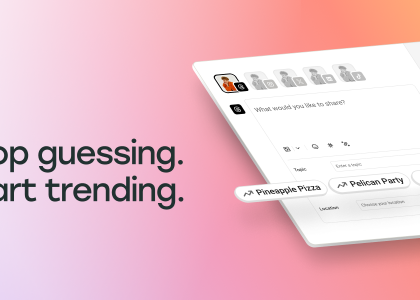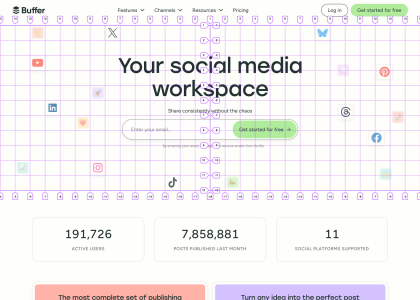It was 2015, and I was in my first year of college when I learned about LinkedIn. Like any normal first-year, I rushed into the platform to create my account to enter the corporate world.
Four years passed, and my account was still sitting brand new with just my name and four or five connections.
Then, per my career objective to become a well-known writer at that time, I had to send my resume and a link to my LinkedIn profile for a gig at a very popular online magazine.
That’s when I had to return to that platform and revamp my account. But I knew it wouldn’t work as it was. I would have to do something with my account to become a credible writer and get selected. So, I started consuming content on LinkedIn. I followed some well-known writers and marketers to keep consuming content related to my industry regularly.
After a few days, I gathered the courage to write my first post on the platform, and to my surprise, I even got five likes on my first post. Ultimately, I was posting, commenting, engaging, and networking in a few weeks. The best part is that I even got the gig by cold-pitching the editor-in-chief of that publication on LinkedIn.
And since then, I have never stopped using LinkedIn. Today, I have over 42k followers, got two full-time opportunities, worked with over 50 clients worldwide, and built a newsletter with 20k subscribers, all thanks to LinkedIn.
In this article, I will share all the key strategies that have helped me get here and how you can apply them to your LinkedIn.
Set up a proper foundation for your LinkedIn
First things first, you need to be intentional about who your target audience is. You don’t need to go after random people following you. You need to grow your follower base and achieve your goals, like finding a job or growing your business. And this can only be done when you know about your target audience.
Create an audience persona that doesn’t need to be very specific – just a basic one to get you started. Your persona might include factors such as industry, job roles, interests, and pain points.
For instance, if you’re in the marketing industry, your audience persona could include professionals in marketing, advertising, or related fields. You can narrow it down further by specifying the level of expertise you’re targeting: entry-level marketers, mid-level managers, or senior executives.
Once you’ve set up the foundation, here are a few strategies that could you grow on LinkedIn.
Follow the 80-20 rule
People love to read content that they can relate to. This means “generic content,” like celebrating a new job or birthday or anything that feels human.
However, there’s also a downside to such posts— while they might get you thousands of likes and comments, they won’t help you build a network of like-minded people and will hardly help you grow your business.
But isn’t getting followers the goal here? The goal is to grow your audience alongside your business.
This is why the best approach often involves niche-specific content and more broadly appealing, engaging content.
To strike the right balance, consider the 80-20 rule, where roughly 80% of your content is niche-specific, focused on your area of expertise, and 20% is engaging generic content. This allows you to showcase your expertise while still appealing to a broader audience and attracting a wider range of followers.
Here’s an example of a generic post: In this post, I just talked about my birthday and how my year had been. This post garnered around 150k impressions, 1.8k+ reactions, and hundreds of followers, but didn’t help me get any leads.
Here’s an example of a targeted post: In this post, I talked about SEO, which is related to what I do and reflects my expertise. This post solely got me five content writing leads within a week.
Try new features as soon as they are released
When a social media platform introduces new features, they often promote them to encourage users to try them. By being an early adopter and using these features, you can benefit from increased visibility and reach as the platform showcases your content to a broader audience.
When the LinkedIn newsletter was released, I was fortunate to be one of the earliest people in my country to get it. I started my Freelancer’s Weekly newsletter as soon as I got the feature. Within three months, I got around 7K subscribers, and currently, I am at around 20k.
How did I grow so fast? When newsletters were new, and people knew that they were just for a handful of users, they got curious and wanted to subscribe. But now, only some people want to subscribe to them.
Similarly, when LinkedIn stories were launched, my stories got thousands of views, and significant people clicked on the links I shared. Even now, as LinkedIn audio events are comparatively new, their engagement rate is much higher than that of others.
Here’s a resource page from LinkedIn that provides insights into different post types and the best practices for their optimal use.
Maintain a swipe file for inspiration
Binge posts from your favorite creators and save the ones you like in one place. You can use tools like Notion or Trello to create a swipe file of your favorite posts. This swipe file will help you post when you don’t know what to post.
Another way to do this is to use a tool like Taplio. Taplio allows you to find top-performing posts on LinkedIn related to your niche. You can also create your own swipe file on Taplio by creating a “Collection.”
This will give you an understanding of what actually works on LinkedIn. I have been following many LinkedIn creators just to learn from them. The idea isn’t to copy, modify, and post but to:
Generate ideas: You can browse through successful posts by others in your industry or niche to get inspired and develop your unique content ideas.Analyze content structures: These posts will help you analyze the structure and formatting of compelling LinkedIn posts. You’d get to understand what works regarding post length, headlines, and visuals. You can use these insights to create well-structured, attention-grabbing posts.Learn copywriting: These posts can be an excellent resource for improving your copywriting skills. You can study the language, tone, and style used in successful posts to craft compelling and engaging LinkedIn copy.Build an engagement strategy: Observe the types of posts that receive a high level of engagement in your swipe file. You can identify the strategies, such as asking questions, running polls, or sharing personal stories, that resonate with your audience and incorporate them into your posts.Headline formulation: Crafting engaging headlines is crucial for LinkedIn posts. A swipe file can provide you with examples of catchy headlines that have garnered attention. You can adapt these ideas for your posts.
Later, you can use Buffer to schedule your posts. The best idea is to schedule your posts one week prior.
Talk to people
It’s a social networking platform, and you gotta connect with people personally. The idea is simple: when you talk directly to people, they become more interested in what you have to share. The more they show their interest, the more reach your content gets.
To make personal connections, don’t just use comments but slide into their DMs. Of course, don’t start selling; maybe just introduce yourself and initiate a conversation. I have got plenty of amazing writing gigs because of just talking.
Here’s a 3-step strategy I suggest to anyone who wants to start networking on LinkedIn.
Step 1: Use the bell icon.
If you like someone’s content, you shouldn’t miss it, and the bell icon on the profile page ensures just that. Turn on notifications for all your favorite creators.
Step 2: Show genuine interest in the form of comments.
If you want to get replied to, you first need to get noticed. People, especially influencers, don’t like replying to unknowns. So, to get noticed, read their posts, comment on them, and not any random comment but something that either adds value or genuinely appreciates.
Step 3: Message them, but don’t spam them.
You need to talk if you want to grow from just a connection to a professional friend. Start with an introduction and tell why you want to connect. Think of them as someone you’ve met, then type your message accordingly.
Ready, Steady, LinkedIn!
As of 2023, LinkedIn has over 900 million users, and only 3 million users share content weekly, which is approximately just 0.33%. This means if you post on LinkedIn even once a week, you’re already in the top 0.33%.
Once you’re posting consistently, follow the abovementioned strategies and start building your audience on LinkedIn.






